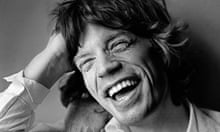Ronnie Wood and I meet a little prior to our interview at a central London hotel, bumping into each other in the lift. “Have I met you before?” he instantly asks. (No; though maybe, after all the years of rock’n’roll hedonism as a guitarist with the Rolling Stones, Wood has to play it safe and ask everybody.) Now 70, he became a new father again last year when his wife, Sally Humphreys (they married in 2012), gave birth to twin girls; he has four other children from previous marriages, and six grandchildren. His signature rock’n’roll look (spiky hair; spiky face), bears no signs of his health crisis earlier this year when he was diagnosed with lung cancer and underwent surgery to remove affected tissue.
Settling down to chat, he is friendly, good-humoured, and sometimes a little distracted, fetching himself cola (his “remaining vice”). An artist as well as a musician (he trained at Ealing College of Art), Wood occasionally reaches over to leaf through his new book, a retrospective of his life’s artworks, Ronnie Wood: Artist, showing me different drawings and paintings.
Are you proud of the book?
Oh yeah! I’ve wanted to do this for at least 50 of my 70 years, but it got more intense for the last 30. There’s that lovely French phrase for a collection of an artist’s work, catalogue raisonné. For me, the book is like that.
Is your art a kind of “sanity project” – something that’s just about you, apart from the Stones?
Art is just something that I’ve always done – a great consoling thing, and something I do on my own. I’ve got the musical group effort and then I’ve got this, my own private comment on daily events. Rarely a day goes by without me doing a painting or a drawing.
Your parents were bargees [people who lived and worked on the rivers and canals] – and became the first in their families to live on dry land...
You can trace a lot of the Woods, and the Dyers, my mum’s maiden name, back to the 18th century – on the waters, carrying timber or salt. Maybe there’s a link to the Spaniards – why else have I got black hair at 70?
You’ve dedicated the book to your late parents and late brothers…
I thanked Mum and Dad for their patience and encouragement. It was only a little council house but they let us have the back room as a creative room. And my brothers were very encouraging – they were 10 years older, artists and musicians too. They made it such a natural thing to be sitting around, drawing and playing. They’d bring back their art school friends – all the girls! I’d be there, in short pants and grey flannels, thinking: “That looks like a good job. Lots of perks on the side, and you can paint too!”
Some people think that you only draw and paint the Stones, and other famous people you know – but the art in the book is very varied…
That may be from when I first tried to make my comeback in the art scene. When I was running out of money, in the late 80s, I realised, I do have another resource that I can tap – I can paint. Let me try to get my foot in that door. So I did portraits, a lot of portraits – some of them are in this book. But you’re also having a great time doing it. Otherwise it wouldn’t be rewarding, and it has to be rewarding.
Keith Richards writes the “outro” to your book, calling you a “Picassartist” – are the Stones supportive of your art?
Yes, but it wasn’t always that way. Keith and Charlie [Watts] are artists in their own right. Charlie used to be critical of me, saying “You’ve overworked that, you had that, and now you’ve done too much”, and never a truer word was said in jest. Keith would always say that there’s a lot in what you don’t say, in the spaces you leave – both when you’re playing, and with pen and canvas. So, yes, I find that you’re always learning, musically and artistically.
Do you still feel like the “new kid” in the Stones?
It’s only 40-odd years! I did my apprenticeship, 17 years, before I got a raise, before I even thought about money. I was like, “Do you think I should get a bit more?” and they were like “Yeah, well, we thought you’d never ask – those who don’t ask, don’t want, mate.”
Maybe you were “sidetracked” – for years, you and Keith Richards were bywords for rock’n’roll excess…
Oh yeah – 10 years went by like that! It was like, “Wh-aaat?”… It’s always good with Keith, great fun. We have that standing argument – which one is the better guitar player? We have to call Eric Clapton and he says, “Neither of you are. I’m better than both of you.” We all still get together [Clapton and the Stones]and every time we meet up it’s like no time has gone by and yet there are so many stories to fill in, so many adventures.
I just fought the cancer, that’s my latest adventure. I smoked heavily for 50 years, and I thought, there’s got to be some price to pay. I hadn’t had a chest x-ray for 16 years, and when I did, sure enough, there was a big shadow there on my lung, a supernova. I thought “fucking hell!”
I definitely went in there with a positive attitude. I thought, right, I’ve got cancer, let’s get it out. They went down my drainpipe, hosepipe … what do they call it? Windpipe! There were all these tubes coming out of me. I felt like a puppet, I was all wired up like a marionette.

It must have made you feel very human and vulnerable?
Yes, though the doctors were really surprised – because I came out the next week and I was back in the studio. You’re not supposed to get better that quickly. A lot of it was celebration in the fact that I was still alive, that it hadn’t spread. There was so much gratitude in the air.
So many artists died in 2016, including David Bowie…
It especially affected me with Bowie because we were the same age – both 1947 models. David and I, we never saw a lot of each other, but when we did, we had a lot in common. With the cancer, he pulled the short straw. I knew he had a stroke as well. Since he hadn’t been doing concerts or public appearances, I knew something fishy was going on with his health. I knew something was up. I was lucky, I got the long straw with the cancer.
As you get older, are you starting to think about legacy – what you’ll leave behind?
With these little twin girls in my life, it just really makes you want to be around longer to watch them grow. Having that second chance, it’s made me even more grateful to enjoy the twins, enjoy the kids I already have, enjoy Sally, enjoy going back on the road, all of it.
Does it sometimes freak you out - that you’re a grandfather, and also the father of very young children?
It’s just how my life has gone. I can’t wait to take them on tour. They’ve already done the Toronto film festival, and the Desert Trip [music festival] in California. They’ve been to Boston, New York, the Albert Hall with Paul Weller… They love people!
You’ve included drawings of Sally in the book, referring to her as your “muse”. Do you respect women?
Oh yeah! My mum always said that I was never happier than when I was in girls’ company – and I really am, I really get inspired.
How do you feel about feminism – not least as a father of daughters?
Oh, I don’t know. I feel that they tell me how they feel. Leah certainly does, in no uncertain terms, bless her. Now, it’s usually to tell me about things to help me – medicine, herbal cures. So do [my sons] Jesse and Tyrone. The recent scare brought out a very caring side – their natural protectiveness came out.
You’ve survived cancer. Looking back, with the Stones, all the drugs and craziness, was there ever a point when you thought that you wouldn’t survive all that?
Both with the drugs and the drink, luckily I had a cut-out point that would rescue me. In the midst of the oblivion, I’d suddenly think something like, “One more of those pills, and it’s all going to be over.” You’re watching people around you, taking them like sweets, all “Wahey!”, and I’d be thinking: “Don’t do that.” You had to be continually on your guard.

If you could do it all again, would you live your life exactly the same?
I was going to say, “Without the smoking”… but when I was growing up, everyone smoked!
Smoking was the hardest thing to give up – harder than the class As?
Smoking would definitely have been the hardest thing to give up. Good old Champix [stop smoking pills] helped. Without the Champix, I don’t think I could have given up for more than a few weeks at a time. The old feeling would have come back, the old excuses – “Oh sod it, I enjoy it!” And I really did enjoy it.
Has luck played a part in your music career?
I’ve definitely been in the right place at the right time, with a little bit of manipulation on my part, just kind of pushing everybody out of the way and getting in. There was also a lot of work. Even as a teenager, I’d be up into the small hours, practising, getting a little lick on my guitar, figuring out how it went together. You make it look like you stumbled on a sound, but a lot of work has gone into it.
What would you find easier to give up – the playing or the art?
That’s a difficult question. But I could give up the playing. I could always pick up the guitar at home [between tours], though I often don’t even do that. Me and Keith, we both realised, at rehearsals, “I don’t think I’ve picked up a guitar since I last saw you.”
Do you wish that more attention had been paid to your art over the years?
No, I’m known as a musician, and people can only take in so much. But, as I say, I’ve done the two things my whole life so it would be nice to be recognised for both of them. I’ve had exhibitions, but nothing permanent – this book is my “permanent exhibition” now. It’s going to be great to see it up there on the shelf, and for me to say, “I’m an artist.”
Ronnie Wood: Artist is published by Thames & Hudson (£24.95). To order a copy for £21.21 go to bookshop.theguardian.com or call 0330 333 6846. Free UK p&p over £10, online orders only. Phone orders min p&p of £1.99











Comments (…)
Sign in or create your Guardian account to join the discussion